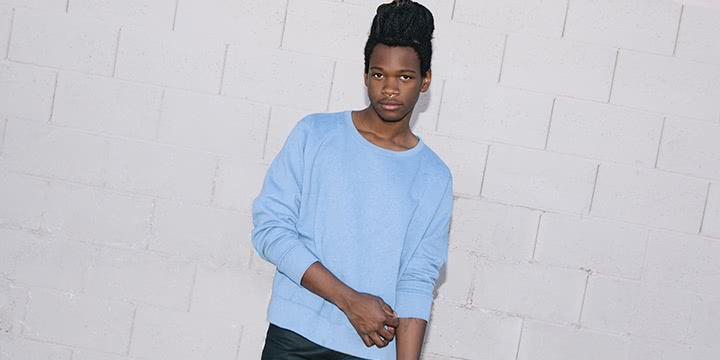Thanks to the release of an industry-shaking, genre-vaulting, candy-pop-pulsating collision course of a debut album – careering through hip hop, disco, soul, R&B, house and ’90s pop – Shamir Bailey became one of the most fascinating performers to emerge in 2015.
Laced with luminous, androgynous vocals, his album Ratchet is nothing short of infectious.
The Las Vegas-born and based Shamir identifies as genderqueer, and is OK with he/him pronouns. He tweeted last year: “To those who keep asking, I have no gender, no sexuality and no fucks to give.”
Speaking to the BRAG, Shamir seeks to clarify that now-famous declaration and how it relates to his career as an artist. “I just hope that it helps people realise that, you know, it’s OK to be different and it’s OK to completely be yourself,” he says.
While the glistening melodies may have had fans hooked from the start, Shamir’s candid lyrics are what have resonated most with listeners. “Everything I write about is like different chapters of my life, you know?” he says. “I feel like it’s definitely an album about kind of like finding yourself or finding your place in the world, like a young adult between 18 and 21. So a lot of it is just like that weird young adolescence, but still completely relatable to anyone around those ages or anyone older who has been through it.”
Shamir’s first big break came when, as a 16-year-old, he emailed Nick Sylvester, head of Brooklyn label Godmode, with demos he had recorded in his bedroom. Soon he was flying across the country to record his debut EP, Northtown. This led to a record deal with XL Recordings, home to the likes of Adele, M.I.A. and FKA Twigs. “It feels amazing,” says Shamir of his sharp ascension. “I mean, it’s literally a dream come true.”
Despite his music impressing tastemakers and fans alike, Shamir’s rise has still caught him by surprise. Even the success of his breakout single ‘On The Regular’ came as a shock. “It’s so funny for me, because I kind of originally wrote it for it to be thrown away,” he laughs. “The track as you know now, it’s a very busy song, it’s a very busy track. I was like, ‘Oh, I can sing that fast.’”
At the same time, Shamir didn’t want the final product to seem to the industry gatekeepers as if he “didn’t at least try to do something to it. So I was like, ‘Yeah, I’m just going to rap. You know, they probably won’t like it, but they can at least see that I tried.’ And yeah, for some reason, everyone seemed to like it and they were like, ‘Oh, this is going to be your first single.’ And I was like, ‘OK then!’”
Shamir grew up with his mother and aunt, always surrounded by music, and away from the casinos and bright lights of the Las Vegas Strip. His aunt always had performers and artists dropping by. “She’s always been like a creative writer,” Shamir explains. “But she doesn’t play anything or sing, so she always had a lot of friends over when I was younger, like musicians and singers … and they’d put music behind the words. And I think they planted the seed for me.”
This led the young Shamir to beg his mum at the age of nine for a guitar, after which he taught himself how to play. Eventually, he began to write his own music. “I think when I got older, my aunt was like, ‘Wait, now I don’t have to look for musicians or singers … to bring my songs to life, when I’ve got my nephew right here.’ So that’s how we started collaborating when I was younger, and yeah, she’s almost like my life songwriting partner, I feel.”
Songwriting is something that now comes quite easily to Shamir. But he strongly believes any song should have a message behind it. “Anybody can write a song, you know, and anybody can write something catchy or good,” he says. “But I just want to make sure that what I’m doing and what I’m putting, you know, my face and personality behind, it must mean something to me. I’m doing what I’m doing with feeling.”
The music Shamir was introduced to during his formative years was so eclectic that it initiated a lifelong love for both country and punk music. “Yeah – it kind of seems crazy, but it was all just kind of a natural evolution,” he says. “And I think now like with my soul stuff I can, you know, kind of mix everything that I did and listened to into one thing that works for me. So everything on Ratchet is influenced by everything. Even ‘Darker’ has a punk sample in it, or ‘Call It Off’ is directly influenced by a country song from Jewel.”
This very idea of being inspired by contrasting or unusual ideas is at the heart of Shamir’s creative process. Wise beyond his 21 years, he believes: “I’m always a person who likes to do, you know, multiple different things, and [am] easily inspired and always want to try something new. So I think at the end of the day, it’s good just to tell people to be themselves, and don’t be scared to be different, you know?”
[Shamir photo by Paley Fairman]
Ratchetis out now through XL/Remote Control, andShamir appears atLaneway Festival 2016, Sunday February 7 atSydney College of the Arts, and also Oxford Art Factory on Thursday February 11.


































